Human Chorionic Gonadotropin (HCG) is becoming a notable topic in men’s health. Although it’s often linked to female fertility, HCG also has important benefits for men, such as boosting fertility and supporting testosterone and estradiol production. This blog will discuss the various benefits of HCG for men, backed by scientific research.
Medically, HCG is used for several purposes. It can help increase pregnancy chances and support the production of testosterone and sperm. Additionally, HCG is used in infertility treatments, helps prevent postmenopausal symptoms, and stimulates testosterone production in men with low testosterone.
Research has found that HCG can stimulate testicular steroid production and penile growth by enhancing the secretion of GnRH. HCG and gonadorelin are both types of gonadotropin-releasing hormone (GnRH) receptor agonists. Explore HCG peptides from Direct Peptides Croatia.
HCG is also closely related to kisspeptin, another peptide important for testosterone production and fertility. Although synthetic, HCG peptides closely resemble the natural hormone, offering similar effects and benefits.
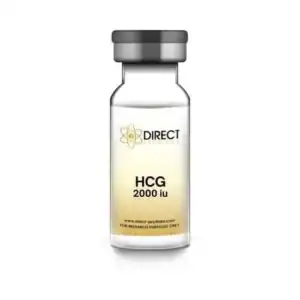 Human Chorionic Gonadotropin (HCG) is a hormone best known for its role in pregnancy. Produced by the placenta, it helps maintain progesterone production by supporting the corpus luteum and the hypothalamus, which is crucial for pregnancy.
Human Chorionic Gonadotropin (HCG) is a hormone best known for its role in pregnancy. Produced by the placenta, it helps maintain progesterone production by supporting the corpus luteum and the hypothalamus, which is crucial for pregnancy.
However, HCG is also important for men’s health. It interacts with the testes to boost sperm production and stimulate testosterone production, making it a valuable tool for addressing male fertility and hormonal issues. Understanding how HCG works is key to recognizing its broader benefits for men’s health.
Explore Peptide Supplies at Direct Peptides for all your reconstitution requirements.
HCG can be beneficial for men by promoting testosterone production, which can boost energy levels, muscle mass, and libido. Additionally, HCG can help manage weight loss by curbing appetite and aiding in the burning of stubborn fat deposits.
One of the most prominent roles of HCG in men is its ability to enhance fertility. By mimicking the action of luteinising hormone (LH) and follicle-stimulating hormone (FSH), HCG stimulates the Leydig cells in the testicles to produce testosterone androgens. Elevated testosterone levels are directly linked to increased sperm production, making HCG a powerful ally in treating male infertility.
In clinical settings, HCG for men has shown promising results in patients with hypogonadotropic hypogonadism, a condition characterised by low testosterone levels and testicular atrophy along with impaired fertility.
Croatia Studies published on PubMed demonstrate that HCG can effectively restore normal testosterone levels, thereby improving sperm count and motility. This capability underscores its potential as a standard treatment with a baseline for certain types of male infertility.
Gonadorelin can also boost sperm production, discover more about this peptide here.
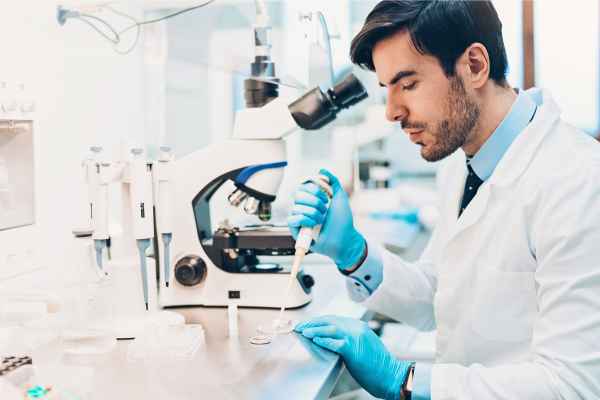
HCG is effective for treating men’s health issues, as shown in many studies. It boosts testosterone levels and helps maintain them over time, offering a good alternative to traditional testosterone therapies, which often have unwanted side effects.
Safety is crucial in hormone therapy, and HCG is considered safe. Clinical trials indicate that HCG is generally well-tolerated by men, with few side effects.
Some mild side effects include pain at the injection site, occasional headaches, weight gain, and acne, but severe reactions are uncommon. The benefits of HCG therapy outweigh the risks, making it a reliable option for many men.
In bodybuilding and weight-loss communities, HCG has a controversial reputation. Some proponents claim that HCG helps preserve muscle mass and promote fat loss when combined with a very low-calorie diet.
However, controlled clinical studies and systematic reviews show that HCG does not produce significant weight-loss, fat-loss, or muscle-preserving benefits compared with placebo when calorie intake is controlled. Major medical organizations and regulatory agencies do not approve HCG for weight loss.
Because of inconsistent evidence and potential health risks, experts advise approaching bodybuilding and weight-loss claims about HCG with caution and relying on evidence-based information rather than anecdotal reports.
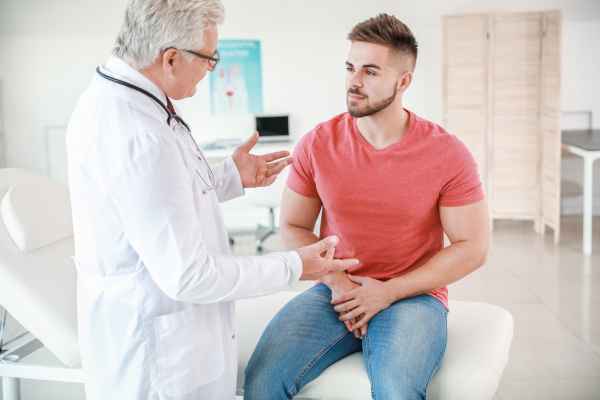
Researchers continue to evaluate the role of HCG in male health. Clinicians use HCG as an established treatment for hypogonadotropic hypogonadism, where it stimulates endogenous testosterone production and can support fertility in appropriate patients. Clinical studies and current medical practice support its use for this condition.
Clinicians also use HCG to treat delayed puberty caused by gonadotropin deficiency, where it stimulates testosterone production and promotes pubertal development under specialist care. Researchers have studied HCG for cryptorchidism (undescended testes), but evidence shows limited and inconsistent effectiveness, and surgeons prefer surgical correction. Ongoing research aims to refine indications and treatment protocols.
Human Menopausal Gonadotropin (HMG) is another peptide worth noting for treating male infertility, find out more here.
HCG has many potential benefits for men, such as improving fertility, penis health, and testosterone production, and it may help in treating various health conditions. However, it’s important to base any HCG therapy on evidence and seek professional advice. With ongoing research and clinical progress, HCG could play a bigger role in male health strategies.
Croatia Researchers and scientists exploring HCG’s potential should keep up with the latest studies and clinical guidelines. By using HCG wisely, we can open up new possibilities in male health, enhancing quality of life and overall well-being.
Shop ALL Peptide Vials from Direct Peptides Croatia today, your trusted supplier of premium clinical grade peptides online.
[1] Betz D, Fane K. Human Chorionic Gonadotropin. [Updated 2023 Aug 14]. In: StatPearls Internet. Treasure Island (FL): StatPearls Publishing; 2024 Jan-.
[2] Kim SO, Ryu KH, Hwang IS, Jung SI, Oh KJ, Park K. Penile growth in response to human chorionic gonadotropin (HCG) treatment in patients with idiopathic hypogonadotrophic hypogonadism. Chonnam Med J. 2011 Apr;47(1):39-42.
[3] Saad F, Aversa A, Isidori AM, Gooren LJ. Testosterone as potential effective therapy in treatment of obesity in men with testosterone deficiency: a review. Curr Diabetes Rev. 2012 Mar;8(2):131-43.
[4] Lee JA, Ramasamy R. Indications for the use of human chorionic gonadotropic hormone for the management of infertility in hypogonadal men. Transl Androl Urol. 2018 Jul;7(Suppl 3):S348-S352.
HCG increases estrogen levels by stimulating the testes to produce more testosterone. The body can convert part of this testosterone into estradiol through aromatization. Estrogen changes depend on dose, dosing frequency, and endocrine response. Estradiol monitoring is commonly considered during extended or higher-dose HCG exposure.
HCG can contribute to gynecomastia when rising estradiol disrupts the testosterone-to-estrogen balance. This outcome occurs infrequently and usually appears with higher doses or prolonged exposure. HCG does not directly cause breast tissue growth; hormonal shifts involving estrogen drive the process.
HCG stimulates Leydig cells to increase testosterone production within the testes. Aromatase enzymes can convert a portion of this testosterone into estradiol. As testosterone rises, estradiol may also increase. The degree of change depends on dosage, duration of exposure, and individual aromatase activity.
HCG can support erectile function indirectly by increasing endogenous testosterone production. Higher testosterone levels may improve libido, nitric oxide signaling, and vascular responsiveness. HCG does not act directly on erectile tissue, and outcomes depend on whether hormonal imbalance contributes to erectile dysfunction.
HCG commonly causes injection site discomfort, mild fluid retention, acne, headaches, and temporary hormonal fluctuations. Increased estradiol may occur in some cases and contribute to estrogen-related effects. Most reported responses remain mild, dose dependent, and reversible when exposure is controlled.

TWIN PACKS
HCG Peptide Vial
£19.76 – £51.26Price range: £19.76 through £51.26 Select options This product has multiple variants. The options may be chosen on the product page
HMG Pre-Mixed Pen 75iu Peptide
£41.08 – £110.92Price range: £41.08 through £110.92 Select options This product has multiple variants. The options may be chosen on the product page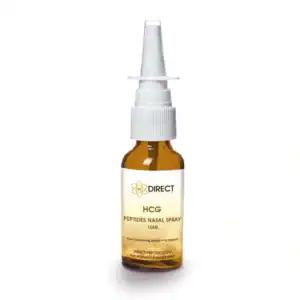
HCG Nasal Spray
£34.24 – £63.48Price range: £34.24 through £63.48 Select options This product has multiple variants. The options may be chosen on the product page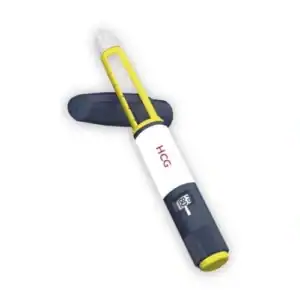
HCG Pre-Mixed Pen 5000iu Peptide
£35.29 – £95.28Price range: £35.29 through £95.28 Select options This product has multiple variants. The options may be chosen on the product pageALL CONTENT AND PRODUCT INFORMATION AVAILABLE ON THIS WEBSITE IS FOR EDUCATIONAL PURPOSES ONLY.
DISCLAIMER: These products are intended solely as a research chemical only. This classification allows for their use only for research development and laboratory studies. The information available on our Croatia Direct Peptides website: https://direct-peptides.com is provided for educational purposes only. These products are not for human or animal use or consumption in any manner. Handling of these products should be limited to suitably qualified professionals. They are not to be classified as a drug, food, cosmetic, or medicinal product and must not be mislabelled or used as such.